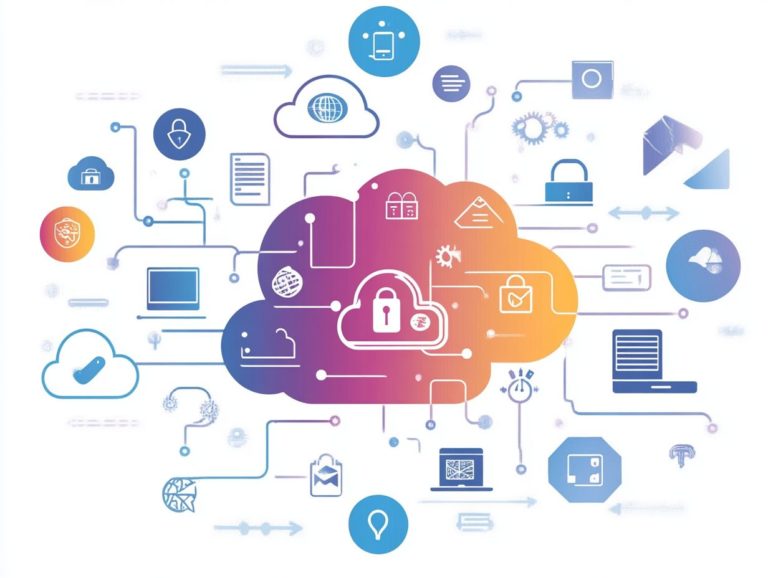Key Cloud Security Regulations to Be Aware Of
Are you ready to protect your data in the cloud? In today s digital landscape, grasping cloud security regulations is vital for protecting sensitive data and ensuring compliance. As you increasingly rely on cloud services, navigating regulations such as GDPR, CCPA, and HIPAA becomes essential.
This article delves into the nuances of cloud security regulations, underscoring their significance and outlining the key regulations that your organization should be well-versed in. It also offers actionable steps to achieve compliance and highlights the potential repercussions of neglecting these critical standards.
Staying informed is crucial for safeguarding your data and maintaining your reputation in the cloud.
Contents
- Key Takeaways:
- Overview of Cloud Security Regulations
- Importance of Compliance with Cloud Security Regulations
- Key Cloud Security Regulations to Know
- How to Ensure Compliance with Cloud Security Regulations
- Consequences of Non-Compliance
- Frequently Asked Questions
- Key Cloud Security Regulations You Should Know
- What is the General Data Protection Regulation (GDPR)?
- Why is Compliance with Cloud Security Regulations Important?
- What is the Health Insurance Portability and Accountability Act (HIPAA)?
- How Do Cloud Service Providers Ensure Compliance?
- What is the Effect of the California Consumer Privacy Act (CCPA) on Cloud Security?
- Conclusion
Key Takeaways:

Being compliant with cloud security regulations is crucial to protect sensitive data and maintain trust with customers.
Some key cloud security regulations to be aware of include GDPR, CCPA, and HIPAA, which have strict guidelines on data protection and privacy. For a deeper dive, consider exploring understanding cloud storage compliance regulations.
To ensure compliance with these regulations, your organization must take steps such as conducting regular audits and implementing security measures.
Overview of Cloud Security Regulations
Cloud security regulations serve as essential frameworks that protect sensitive information within cloud environments, ensuring that your organization meets various compliance requirements like GDPR, HIPAA, FedRAMP, and ISO standards.
These regulations delineate best practices for data protection, highlighting the necessity of strong security practices and ongoing monitoring to mitigate risks associated with data breaches and security threats.
As a cloud service provider, aligning your operations with these regulatory standards is vital for maintaining customer trust and safeguarding personal data, including financial records and payment information.
What Are Cloud Security Regulations?
Cloud security regulations refer to the legal and operational guidelines you must follow to ensure the protection of sensitive information stored and processed in cloud environments. These regulations are designed to mitigate risks associated with data breaches, ensuring that personal and sensitive data is handled appropriately.
For instance, the General Data Protection Regulation (GDPR) establishes stringent standards for data protection within the European Union, mandating that your organization implement measures to secure personal data and uphold individuals’ rights.
Similarly, the Health Insurance Portability and Accountability Act (HIPAA) plays a critical role in protecting sensitive patient information in the healthcare sector, stipulating specific security measures for managing electronic health records.
Compliance with these regulations not only safeguards data but also fosters trust with your customers and stakeholders, underscoring the importance of adhering to such guidelines in an increasingly digital landscape.
Importance of Compliance with Cloud Security Regulations
Compliance with cloud security regulations is crucial for organizations managing sensitive information. It not only protects personal data but also showcases your commitment to data security.
By prioritizing these regulations, you foster customer trust and effectively safeguard against potential data breaches.
Benefits of Compliance
The benefits of compliance with cloud security regulations are substantial, leading to enhanced data security, minimized risks of data breaches, and improved alignment with regulatory standards.
By adopting best practices such as regular security assessments and employee training, your organization can cultivate a robust security posture that not only meets compliance requirements but also nurtures a culture of accountability.
Implementing comprehensive security solutions, like advanced encryption and multi-factor authentication, further fortifies your defenses.
In the long run, committing to these compliant practices not only protects your operational integrity but also fosters lasting trust with customers, who gain confidence in sharing their data with organizations that prioritize their security and adhere to regulatory frameworks.
Key Cloud Security Regulations to Know

Grasping the essential cloud security regulations is crucial for effectively navigating the intricate compliance landscape.
This includes understanding pivotal regulations like GDPR, HIPAA, FedRAMP, and ISO standards, which are fundamental to safeguarding your organization s integrity and reputation.
Don t wait until it s too late start your compliance journey today!
Assess your compliance status right away to ensure that you are protecting your data and adhering to necessary regulations.
GDPR (General Data Protection Regulation)
The General Data Protection Regulation (GDPR) is an important law that regulates the processing and storage of personal data within the European Economic Area. It establishes significant privacy rights for individuals.
This regulation gives you essential rights, such as the ability to access, rectify, and erase your data. It underscores the principle of data minimization, meaning organizations should only collect the data that is absolutely necessary.
For entities that handle substantial amounts of personal information cloud service providers, for instance GDPR compliance is especially critical. These organizations must implement rigorous data protection measures to shield against breaches, ensuring they adhere to the guidelines to avoid hefty fines.
The implications of GDPR go beyond mere compliance; they necessitate a cultural shift within organizations, encouraging a proactive approach to data management that prioritizes both privacy and security.
CCPA (California Consumer Privacy Act)
The California Consumer Privacy Act (CCPA) puts you in the driver s seat when it comes to your personal data, granting you enhanced rights and requiring businesses to meet specific privacy obligations.
This legislation allows you to access the personal information that companies hold about you and even request its deletion. Under the CCPA, you have the right to ask what data is being collected, how it s being used, and with whom it s shared. This promotes a greater sense of transparency.
Organizations in California must comply with stringent regulations and adopt practices that genuinely prioritize your privacy. By ensuring compliance, businesses can foster stronger relationships with you, ultimately enhancing the trust and loyalty that are vital in today s digital landscape.
HIPAA (Health Insurance Portability and Accountability Act)
The Health Insurance Portability and Accountability Act (HIPAA) sets forth standards for protecting and securely managing sensitive information in the healthcare sector. This legislation has become increasingly vital in today s digital landscape, where cloud environments play a crucial role in storing and managing healthcare data.
You ll find that specific provisions of HIPAA require organizations like yours to implement safeguards that uphold patient privacy rights and meet data security requirements. As a covered entity, you need to conduct thorough risk assessments to pinpoint potential vulnerabilities in your cloud-based systems.
By embracing encryption technologies, access controls, and regular audits, you can greatly enhance your data protection! Your commitment to maintaining strong security protocols not only protects sensitive patient information but also cultivates trust and confidence in the healthcare system as a whole.
How to Ensure Compliance with Cloud Security Regulations
To ensure compliance with cloud security regulations, you must adopt a structured approach. This involves conducting thorough risk assessments, implementing robust security measures, and establishing a continuous compliance monitoring framework.
By doing so, you can navigate the complexities of cloud security with confidence and protect your organization effectively.
Steps to Take

Organizations aiming to ensure compliance with cloud security regulations should engage in a series of essential steps, including conducting thorough risk assessments and establishing robust vendor management practices.
The significance of these actions cannot be overstated, as they form the foundation for a secure and compliant cloud environment. Once you’ve assessed risks, it’s crucial to develop detailed security policies that clearly define acceptable use, data handling, and access controls.
Implementing regular training sessions will help ensure that all employees grasp these policies and understand their vital role in maintaining security. By integrating continuous monitoring processes, your organization can detect potential threats in real-time, allowing for swift responses to incidents.
Establishing a clear incident response plan mitigates damage and equips you with valuable insights to learn and adapt from security breaches, ultimately enhancing your overall compliance posture.
Don t wait! Start your compliance journey today!
Consequences of Non-Compliance
The consequences of not complying with cloud security regulations can be severe. They may include substantial penalties, reputational harm, and heightened security risks.
This highlights that it s crucial to follow these rules to safeguard your organization s integrity and security.
Potential Penalties and Repercussions
Penalties for non-compliance with cloud security regulations can be harsh, including hefty fines, legal ramifications, and reputational damage. These factors can undermine your organizational structure and erode customer trust.
Consider the repercussions organizations have faced due to data breaches. For instance, the Equifax incident compromised millions of personal records and resulted in a staggering fine of $700 million.
These financial penalties serve as a reminder that adhering to regulations is not just a legal requirement; it’s a vital part of effective risk management. Failure to comply could jeopardize customer loyalty and inflict irreversible damage on your brand’s reputation. This underscores the urgent need for stringent security measures and regular audits to protect sensitive data in the cloud.
Frequently Asked Questions
Key Cloud Security Regulations You Should Know
The key cloud security regulations include the General Data Protection Regulation (GDPR), the Health Insurance Portability and Accountability Act (HIPAA), the Payment Card Industry Data Security Standard (PCI DSS), the Federal Risk and Authorization Management Program (FedRAMP), and the California Consumer Privacy Act (CCPA).
What is the General Data Protection Regulation (GDPR)?

The General Data Protection Regulation (GDPR) is an EU regulation that sets guidelines for collecting, processing, and storing personal data of individuals within the EU. It applies to all organizations handling EU citizens’ personal data, regardless of their location.
Why is Compliance with Cloud Security Regulations Important?
Complying with cloud security regulations is essential for protecting sensitive data and avoiding legal and financial consequences. Non-compliance can lead to hefty fines, damage to your business reputation, and potential lawsuits.
What is the Health Insurance Portability and Accountability Act (HIPAA)?
The Health Insurance Portability and Accountability Act (HIPAA) is a U.S. federal law that establishes data privacy and security requirements for protecting healthcare information. It applies to healthcare providers, health plans, and healthcare clearinghouses.
How Do Cloud Service Providers Ensure Compliance?
Cloud service providers ensure compliance by implementing security measures like data encryption and access controls. Data encryption protects information by converting it into a secure format, while access controls restrict who can view or use that data. They also conduct regular audits and offer compliance certifications to meet changing regulatory requirements.
What is the Effect of the California Consumer Privacy Act (CCPA) on Cloud Security?
The California Consumer Privacy Act (CCPA) regulates how for-profit organizations collect and use the personal information of California residents. It requires businesses to disclose their data collection practices and gives consumers the right to opt-out of the sale of their personal data. This regulation compels cloud service providers to adjust their data handling processes to ensure compliance.
Conclusion
Compliance with cloud security regulations is not just a legal necessity; it is critical for maintaining customer trust and protecting sensitive data. Organizations must take proactive steps to ensure they meet these requirements to avoid severe consequences.






